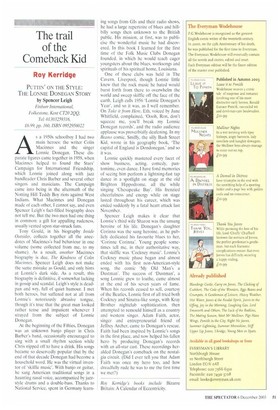The trail of the Comeback Kid
Roy Kerridge
PUTTIN' ON THE STYLE: THE LONNIE DONEGAN STORY by Spencer Leigh FinbanInternational, Folkestone, Kent CT20 2QQ, Tel: 01303259316, £6.99. pp. 160, ISBN 0952950022 As a 1950s schoolboy I had two main heroes: the writer Colin Macinnes and the singer Lonnie Donegan. These disparate figures came together in 1958, when Macinnes helped to found the Stars' Campaign for International Friendship, which Lonnie joined along with jazz bandleader Chris Barber and several other singers and musicians. The Campaign came into being in the aftermath of the Notting Hill Teddy Boy riots against West Indians, What Macinnes and Donegan made of each other, I cannot say, and even Spencer Leigh's fact-filled biography does not tell me. But the two men had one thing in common: a gift for appalling rudeness, usually vented upon star-struck fans.
Tony Gould, in his biography Inside Outsider, collects together all the anecdotes of Macinnes's bad behaviour in one volume (some collected from me, to my shame). As a result, another Macinnes biography is due, The Kindness of Colin Macinnes. Spencer Leigh does not make the same mistake as Gould, and only hints at Lonnie's dark side. As a result, this biography is definitive, if somewhat lacking in gossip and scandal. Leigh's style is deadpan and wry, full of quiet humour. I met both heroes, but suffered not at all from Lonnie's notoriously abrasive tongue, though it's true that the great man looked rather tense and impatient whenever I strayed from the subject of Lonnie Donegan.
At the beginning of the Fifties, Donegan was an unknown banjo player in Chris Barber's band, occasionally encouraged to sing with a small rhythm section while Chris nipped off to have a drink. His songs became so deservedly popular that by the end of that decade Donegan had become a household word. He was the virtual inventor of 'skiffle music'. With banjo or guitar, he sang American traditional songs in a haunting nasal voice, accompanied by jazzstyle drums and a double-bass. Thanks to National Service, spent in Germany learn
ing songs from GIs and their radio shows, he had a large repertoire of blues and hillbilly songs then unknown to the British public. His mission, at first, was to publicise the wonderful music he had discovered. In this book I learned for the first time of the Folk Music Clubs Donegan founded, in which he would teach eager youngsters about the blues, worksongs and spirituals of his spiritual home, Louisiana.
One of these clubs was held in The Cavern, Liverpool, though Lonnie little knew that the rock music he hated would burst forth from there to overwhelm the world and sweep skiffle off the face of the earth. Leigh calls 1956 'Lonnie Donegan's Year', and so it was, as I well remember. On Take it from Here. Eth, voiced by June Whitfield, complained, `Oooh, Ron, don't squeeze me, you'll break my Lonnie Donegan records', and the radio audience applause was proverbially deafening. In my Beano comic, Smiffy, the silly Bash Street Kid, wrote in his geography book. 'The capital of England is Dondonegan,' and so it was.
Lonnie quickly mastered every facet of show business, acting, comedy, pantomime, even dance. [have fond memories of seeing him perform a lightning-fast tap dance in a spotlight on stage at the old Brighton Hippodrome, all the while singing 'Chesapeake Bay'. His frenzied cheerfulness and energy while on stage lasted throughout his career, which was ended suddenly by a fatal heart attack last November.
Spencer Leigh makes it clear that Lonnie's third wife Sharon was the unsung heroine of his life. Donegan's daughter Corinna was the sung heroine, as he publicly dedicated his favourite blues to her, 'Corinne Corinna'. Young people sometimes tell me, in their authoritative way, that skiffle was 'Cockney music'. Lonnie's Cockney music phase began and almost ended with his first non-American-style song, the comic 'My Old Man's a Dustman'. The success of 'Dustman', a song Lonnie grew to loathe, came almost at the end of his seven years of fame. When his records ceased to sell, courtesy of the Beatles, Lonnie first of all tried both Cockney and Sinatra-like songs, with Kray Brother nightclub sophistication, then attempted to remould himself as a country and western singer. Adam Faith, actor, singer and entrepreneurial friend of Jeffrey Archer, came to Donegan's rescue. Faith had been inspired by Lonnie's songs in the first place, and now helped his fallen hero by producing Donegan's records with an all-star cast. These recordings heralded Donegan's comeback on the nostalgia circuit. (Did I ever tell you that Adam Faith was once my hero too, and how dreadfully rude he was to me the first time we met?) Roy Kemdge's books include Bizarre Britain: A Calendar of Eccentricity.


























































































 Previous page
Previous page